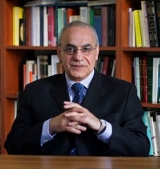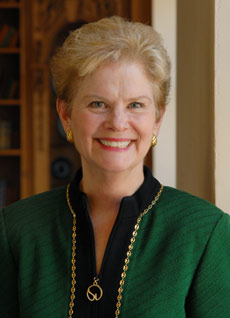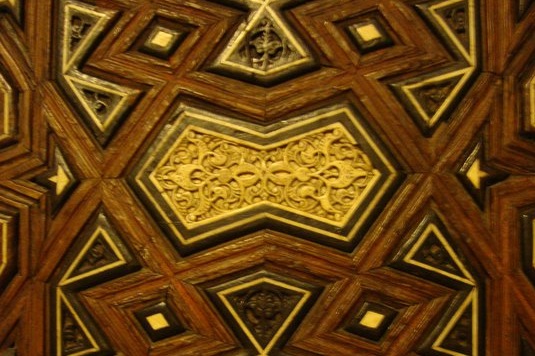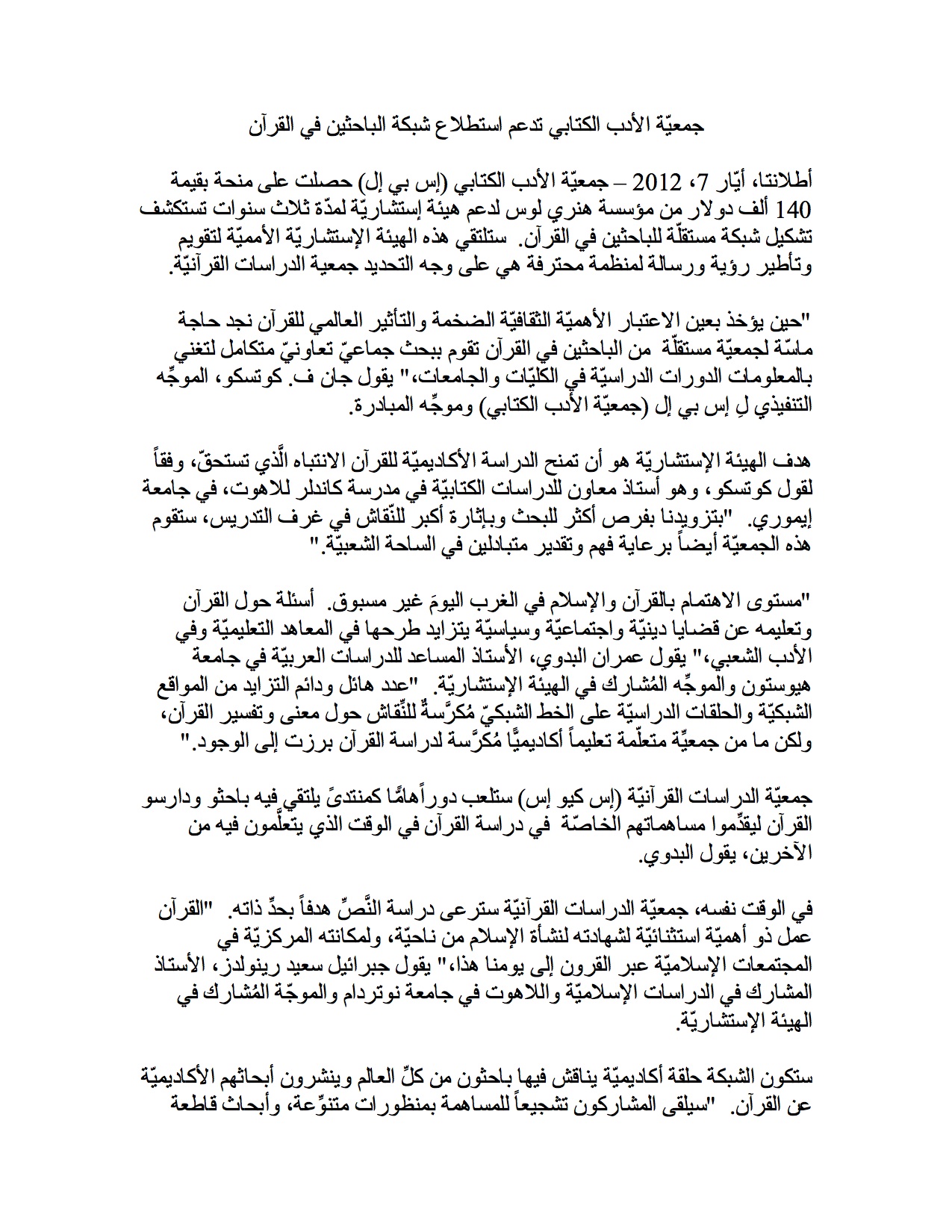Our Annual Meeting in Baltimore, MD (Full Schedule and Registration Details)
By Emran El-Badawi and Gabriel Reynolds (With special thanks to Charles Haws)
The International Qur’anic Studies Association is happy to announce the full schedule of its first annual meeting, taking place in Baltimore, MD from November 22-24, 2013. You may recall our earlier announcement informing you about our exciting program for the first day. See the schedule below, but note that room assignments are still pending.
Given that this is IQSA’s inaugural meeting as well as the heightened public interest, the directors and steering committee have decided to make registration for to all IQSA panels on Friday Nov 22 (including the keynote lecture and response) free and open to the public. Those interested are further encouraged to attend IQSA panels on Saturday Nov 23 and Sunday Nov 24 by paying the registration fee of the Society of Biblical Literature – or – American Academy of Religion. Finally, you are encouraged to subscribe to our blog in order to receive weekly news updates about our meetings, as well as informed posts on Qur’anic Studies today.
On behalf of the co-directors, steering committee and partners we thank you for your enthusiasm and support for IQSA.We look forward to seeing you in Baltimore!
International Qur’anic Studies Association
11/22/2013
1:30 PM to 4 PM
Room: Baltimore Convention Center – 345
Qur’an Manuscripts: Text, Object and Usage
Gabriel Reynolds, University of Notre Dame, Presiding
Keith Small, London School of Theology
Gems of the Bodleian: Qur’an Manuscripts at Oxford University (20 min)
Discussion (10 min)
Simon Rettig, Freer Gallery of Art and Arthur M. Sackler Gallery
Codicology versus History of Art? Rethinking the Visual Study of Qur’an Manuscripts (20 min)
Discussion (10 min)
Alasdair Watson, Bodleian Libraries
The King’s Mushafs: A Glimpse at Some of the Qur’ans from Tipu Sultan’s Royal Library (20 min)
Discussion (10 min)
Asma Hilali, Institute of Ismaili Studies
The Manuscript 27.1 DAM: Sacred Words and Words about the Sacred (20 min)
Discussion (10 min)
Break (30 min)
International Qur’anic Studies Association
11/22/2013
4:30 PM to 5:45 PM
Room: Baltimore Convention Center – 345
Keynote Lecture: Implausibility and Probability in Studies of Qur’anic Origins
Emran El-Badawi, University of Houston, Introduction (10 min)
Aziz Al-Azmeh, Central European University, Budapest, Panelist (45 min)
Jane McAuliffe, Bryn Mawr University, Respondent (20 min)
International Qur’anic Studies Association
11/23/2013
9:00 AM to 11:30 AM
Room: Hilton Baltimore Convention Center Hotel – Paca
Theme: Approaches and Theories on the Translation of the Qur’an
Helen Blatherwick, University of London, Presiding
Maria Dakake, George Mason University
The Original Soul and the “Womb” of Kinship: The Feminine and the Universal in Qur’an 4:1 (25 min)
A. J. Droge, Translator
Traduttore, Traditore? Revisiting Mr. Nabokov (25 min)
Devin J. Stewart, Emory University
The Translation of Divine Epithets in the Qur’an (25 min)
Omar Tarazi, Independent Scholar
Translating the Qur’an’s Aesthetic and Intellectual Features into Plain English (25 min)
Shawkat M. Toorawa, Cornell University
Translation and the Sad Fate of the Qur’an’s Most (?) Important Feature (25 min)
Discussion (25 min)
International Qur’anic Studies Association
11/23/2013
1:00 PM to 3:30 PM
Room: Marriott Baltimore Inner Harbor – Stadium Ballroom II
Theme: Qu’ran and Gender
Farid Esack, University of Johannesburg, Presiding
Juliane Hammer, University of North Carolina at Chapel Hill
Equity, Equality, or Hierarchy: American Tafsir on Gender Roles in Marriage (20 min)
Discussion (10 min)
Kecia Ali, Boston University
Destabilizing Gender, Reproducing Maternity: Qur’anic Narratives of Mary (20 min)
Discussion (10 min)
Marion Holmes Katz, New York University
The Ethical Body and The Gendered Body In The Qur’an (20 min)
Discussion (10 min)
Hamza M. Zafer, University of Washington
The Sons (and Daughters) of Israel: Gender In Qur’anic Negotiations of Jewish Lineage (20 min)
Discussion (10 min)
Aziz al-Azmeh, Central European University, Respondent (10 min)
Discussion (20 min)
International Qur’anic Studies Association
Joint Session With: International Qur’anic Studies Association, Qur’an and Biblical Literature
11/23/2013
4:00 PM to 6:30 PM
Room: Marriott Baltimore Inner Harbor – Stadium Ballroom II
Michael Pregill, Elon University, Presiding
Michael Graves, Wheaton College (Illinois)
Kernel Texts and Prophetic Logia: Biblical and Quranic Scholarship in Dialogue (20 min)
David Penchansky, University of Saint Thomas (Saint Paul, MN)
Daughters of Deity in the Bible and the Quran (20 min)
Abdulla Galadari, University of Aberdeen
Begotten of God: A Quranic Interpretation of the Logos (20 min)
David Hollenberg, University of Oregon
Ships of Faith, Islands of Salvation: Stories of the Prophets as Intra-Sectarian Shi’ite Polemic (20 min)
Clare Wilde, University of Auckland
Quranic Echoes of the bnay qeyama (20 min)
Discussion (20 min)
Business Meeting (20 min)
International Qur’anic Studies Association
Joint Session With: International Qur’anic Studies Association, Qur’an and Biblical Literature
11/24/2013
1:00 PM to 3:30 PM
Room: Hilton Baltimore Convention Center Hotel – Johnson B
Theme: Modern Muslim Critics of Bible and Isra’iliyyat
Brannon Wheeler, United States Naval Academy, Presiding
Gabriel Said Reynolds, University of Notre Dame
Reading the Bible with Ahmad Deedat (20 min)
Michael Pregill, Elon University
Modern Critics of Isra’iliyyat and the Problem of Isma’ (20 min)
Younus Mirza, Allegheny College
Abridging the Isra’iliyyat: Shaykh Ahmad Shakir’s (d.1377/1958) Summary of Tafsir Ibn Kathir (20 min)
Roberto Tottoli, Universita degli Studi di Napoli l’Orientale
Isra’iliyyat: A Tool of Muslim Exegesis and Western Studies (20 min)
Discussion (20 min)
© International Qur’anic Studies Association, 2013. All rights reserved.











